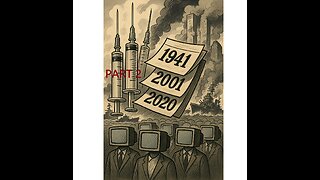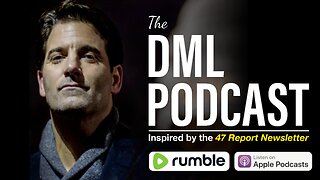Premium Only Content

Thoughts on the importance of Covenants in the bible
I was thinking about the covenant.
I was thinking about how it’s a relationship of love, sealed by grace—but it still demands faithfulness.
This is key: SEALED by GRACE.
Hebrews 10:29
“How much worse punishment... for the one who has trampled the Son of God, profaned the blood of the covenant... and outraged the Spirit of grace?”
The seal is BROKEN if you outrage the Holy Spirit.
Eph. 1
13 In him you also, when you heard the word of truth, the gospel of your salvation, and believed in him, were SEALED with the promised Holy Spirit, 14 who is the guarantee of our inheritance until we acquire possession of it, to the praise of his glory. - English Standard Version.
So, we do NOT possess this inheritance yet. The Holy Spirit is the guarantee of our inheritance UNTIL WE AQUIRE possession of it.
God gives the Spirit as a binding pledge, a covenantal promise.
But it is not unconditional—the recipient must remain faithful.
The seal is meant to carry you all the way to possession—but it can be outraged (Hebrews 10:29) or grieved (Ephesians 4:30)
If the guarantee were the inheritance itself, there would be no need for warnings, no need for endurance, and no logic to verses like:
Romans 8:17 – “…heirs of God and fellow heirs with Christ, provided we suffer with him…”
Colossians 1:22–23 – “…he has now reconciled you… if indeed you continue in the faith…”
2 Peter 1:10 – “Be diligent to make your calling and election sure…”
Phillippians 3: 12 Not that I have already obtained this or am already perfect, but I press on to make it my own, because Christ Jesus has made me his own.
Therefore, Ephesians 1 says the Spirit is the guarantee of our inheritance—not that the inheritance is already guaranteed. That’s a huge difference. A guarantee is only meaningful until it’s voided—or fulfilled. And Hebrews 10 says the Spirit of grace can be outraged. You don’t outrage the seal (The Holy SPirit) and expect to collect the inheritance.
The covenant, sealed by Christ’s holy blood, is not a license to sin but a salvational relationship. Luke 22:20 declares the cup as ‘the new covenant in my blood,’ sanctifying us for salvation. Hebrews 10:29 warns of ‘worse punishment’ for those who profane this blood by using its holy purpose—salvation from sin—for wickedness, like justifying willful sin. This outrages the Spirit of grace, risking eternal judgment, as Hebrews 10:27’s ‘fury of fire’ echoes Matthew 25:41. Romans 6:1–2 rejects this: ‘Shall we sin that grace may abound? By no means!’ The covenant transforms us (Jeremiah 31:34), not enables sin.
More Support:
Ephesians 2:12–13: “You were… separated from Christ, alienated from the commonwealth of Israel and strangers to the covenants of promise, having no hope and without God in the world. But now in Christ Jesus you who once were far off have been brought near by the blood of Christ.”
This passage explicitly ties salvation to covenantal inclusion. Being “strangers to the covenants of promise” equates to having “no hope,” while being “brought near” through Christ’s blood places believers within the covenant, where salvation is accessed.
Hebrews 9:15: “He is the mediator of a new covenant, so that those who are called may receive the promised eternal inheritance.”
Salvation (the “eternal inheritance”) is mediated through the new covenant, reinforcing that covenantal membership is essential for salvation.
Luke 22:20: “This cup that is poured out for you is the new covenant in my blood.”
Jesus establishes the new covenant through His blood, linking salvation directly to this covenantal framework.
Hebrews 8:6–13: Describes the new covenant as superior, with God’s laws written on hearts and sins forgiven, fulfilled through Christ’s mediation.
The new covenant is the mechanism through which God’s salvific promises are realized, making it indispensable.
Acts 4:12: “There is salvation in no one else, for there is no other name under heaven given among men by which we must be saved.”
While not explicitly mentioning “covenant,” this underscores that salvation is exclusively through Christ, who mediates the new covenant (Hebrews 12:24), implying no salvation outside this framework.
The Door Stays Open—Until You Slam It Shut
The only sin that can’t be forgiven is the one you refuse to confess and turn from.
“If we confess our sins, He is faithful and just to forgive us and to cleanse us from all unrighteousness.” — 1 John 1:9
There’s no footnote here saying, “Unless you used to believe and then walked away.”
It doesn’t say “unless you sinned knowingly.”
It just says: If you confess—He forgives.
I add this because some people question if they can still have forgiveness.
The Bible is full of people who believed, fell hard, and came back
🔸 Peter — Believed. Denied Jesus 3 times. Forgiven and restored.
🔸 David — Loved God. Committed adultery and murder. Forgiven after repentance.
🔸 The Prodigal Son — Grew up in his father’s house, walked away knowingly, lived in sin. When he came back, the father ran to him.
Luke 15:24 – “For this my son was dead, and is alive again; he was lost, and is found.”
Even after denying God, there is a way back
Isaiah 55:7
“Let the wicked forsake his way… let him return to the Lord, that He may have compassion… for He will abundantly pardon.”
Jeremiah 3:22
“Return, O faithless sons; I will heal your faithlessness.”
You may worry and think, ‘I knew better… I used to believe… I turned away—maybe God won’t take me back.’
But the whole message of the gospel is: Return.
The cross doesn’t just cover accidental sins—it covers defiance, backsliding, and rebellion.
As long as you haven’t hardened your heart beyond repentance, the door is still open.
If you’re willing to come back, then you haven’t gone too far.”
-
 2:07:48
2:07:48
The Protestant View
1 month ago9-11 and Charlie Kirk - Idiocracy and Controlled Opposition Part 2
882 -
 LIVE
LIVE
Side Scrollers Podcast
3 hours agoAsmongold SUED for Emotional Distress + Hasan REJECTED+ INSANE Plane Crash + More | Side Scrollers
704 watching -
 1:00:32
1:00:32
VINCE
5 hours agoNYC Has Been Seized By The Communists | Episode 162 - 11/05/25
202K304 -
 1:47:26
1:47:26
LadyDesireeMusic
2 hours agoLive Piano & Convo Rumble Rants/ Subs to Request
7.96K2 -
 LIVE
LIVE
SOLTEKGG
4 hours agoGOING FOR KILL RECORD - BF6 SKIN Giveaway
60 watching -
 1:04:48
1:04:48
The Rubin Report
3 hours agoCharlie Kirk’s Warning for MAGA if Mamdani Won
36.7K132 -
 1:33:32
1:33:32
Graham Allen
5 hours agoTold You The War Was FAR From Over… The Blue Wave Just Proved It! Evil Is Fighting Back!
121K107 -
 2:54:17
2:54:17
Badlands Media
11 hours agoBadlands Daily: November 5, 2025 – Election Illusions, Filibuster Fallout & The Deep State’s Next Move
109K12 -
 3:01:00
3:01:00
Wendy Bell Radio
9 hours agoLike Sheep To Slaughter
132K124 -
 1:13:30
1:13:30
DML
5 hours agoDML LIVE: NYC Goes Socialist: Mamdani’s Victory
83.6K30